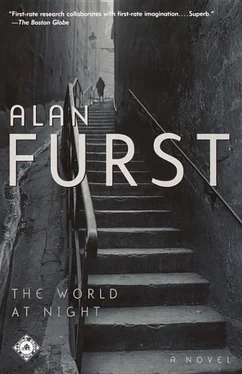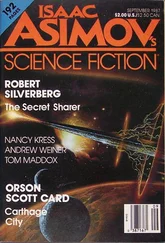Alan Furst - The World at Night
Здесь есть возможность читать онлайн «Alan Furst - The World at Night» весь текст электронной книги совершенно бесплатно (целиком полную версию без сокращений). В некоторых случаях можно слушать аудио, скачать через торрент в формате fb2 и присутствует краткое содержание. Жанр: Шпионский детектив, на английском языке. Описание произведения, (предисловие) а так же отзывы посетителей доступны на портале библиотеки ЛибКат.
- Название:The World at Night
- Автор:
- Жанр:
- Год:неизвестен
- ISBN:нет данных
- Рейтинг книги:5 / 5. Голосов: 1
-
Избранное:Добавить в избранное
- Отзывы:
-
Ваша оценка:
- 100
- 1
- 2
- 3
- 4
- 5
The World at Night: краткое содержание, описание и аннотация
Предлагаем к чтению аннотацию, описание, краткое содержание или предисловие (зависит от того, что написал сам автор книги «The World at Night»). Если вы не нашли необходимую информацию о книге — напишите в комментариях, мы постараемся отыскать её.
The World at Night — читать онлайн бесплатно полную книгу (весь текст) целиком
Ниже представлен текст книги, разбитый по страницам. Система сохранения места последней прочитанной страницы, позволяет с удобством читать онлайн бесплатно книгу «The World at Night», без необходимости каждый раз заново искать на чём Вы остановились. Поставьте закладку, и сможете в любой момент перейти на страницу, на которой закончили чтение.
Интервал:
Закладка:
But she was proud, a fighter. Yes, he’d set her in motion, riding up and down on the swell of the wave, but he would not escape, no matter what happened to her. It was happening; she too remembered the afternoons at the house in Deauville, remembered the things that happened, remembered some things that could have happened but didn’t. She tensed, twisted, almost broke free, then shuddered, and shuddered again. Now, the conqueror thought, let’s roll you over, with your red toenails and your white ass and-
No. That wouldn’t happen.
The world floated away. She crawled back to meet him by the pillows, they kissed a few times as they fell asleep, warm on a spring night, a little drunk still, intending to do it again, this time in an even better way, then darkness.
A loud knock on the door, the voice of the concierge: “Monsieur Casson, s’il vous plait.”
Half asleep, he pulled on his pants and an undershirt. It was just barely dawn, the first gray light touching the curtain. He unbolted the door and opened it. “Yes?”
Poor Madame Fitou, who worshiped propriety in every corner of the world. Clutching a robe at her throat, hair in a net, her old face baggy and creased with sleep. The man by her side wore a postal uniform. “A telegram, monsieur,” she said.
The man handed it over.
Who was it for? The address made no sense. CASSON, Corporal Jean C. 3rd Regiment, 45th Division, XI Corps. Ordered to report to his unit at the regimental armory, Chateau de Vincennes, by 0600 hours, 11 May, 1940.
“You must sign, monsieur,” said the man from the post office.
A COUNTRY AT WAR
The column came into the village of St.-Remy, where the D 34 wandered through plowed fields of black earth that ran to the horizon, to the fierce blue sky. The mayor waited in front of the boulangerie, his sash of office worn from waist to shoulder over an ancient suit. A serious man with a comic face-walrus mustache, pouchy eyes-he waved a little tricolor flag at the column as it passed. It took two hours, but the mayor never stopped. All along the village street, from the Norman church to the Mairie with geraniums in planter boxes, the people stood and cheered -“Vive la France!” The war veterans and the old ladies in black and the kids in shorts and the sweet girls.
A unit of the Section Cinematographique, attached to the Forty-fifth Division headquarters company, headed north in the column of tanks, gasoline trucks, and staff cars. The unit, assigned to take war footage for newsreels, included the producer Jean Casson-now Corporal Casson, in a khaki uniform-a camera operator named Meneval, like Casson recalled to service, and a commander, a career officer called Captain Degrave. They were supposed to have a director, Pierre Pinot, but he had reported to the divisional office at Vincennes, then disappeared; averse to war, the Wehrmacht, or the producer-Casson suspected it was the latter. The unit had a boxy Peugeot 401 painted army green, and an open truck, loaded with 55-gallon drums of gasoline, 35-millimeter film stock in cans, and two Contin-Souza cameras, protected from the weather by a canvas top stretched over the truck’s wooden framework.
The village of St.-Remy disappeared around a bend, the road ran for a time by the river Ourcq. It was a slow, gentle river, the water held the reflections of clouds and the willows and poplars that lined the banks. To make way for the column a car had been driven off the road and parked under the trees. It was a large, black touring car, polished to a perfect luster. A chauffeur stood by the open door and watched the tanks rumbling past. Casson could just make out a face in the window by the backseat; pink, with white hair, perhaps rather on in years. The column was long, and probably the touring car had been there for some time, its silver grille pointed south, away from the war.
Casson had hoped, in the taxi on the way to the fortress at Vincennes, that it was all a magnificent farce-the work of the French bureaucracy at the height of its powers. But it wasn’t that way at all and in his heart he knew it. At the divisional headquarters, a long line of forty-year-old men. The major in charge had been stern, but not unkind. He’d produced Casson’s army dossier, tied in khaki ribbon, his name lettered in capitals across the cover. “You will leave for the front in the morning, Corporal,” he’d said, “but you may contact whoever you like and let them know that you’ve been returned to active duty.”
From a pay phone on the wall of the barracks he’d called Gabriella and told her what had happened. She asked what she could do. Call Marie-Claire, he said, keep the office open as long as possible, explain to the bank. Yes, she said, she understood. There was nothing but composure in her voice, yet Casson somehow knew there were tears on her face. He wondered, for a moment, if she were in love with him. Well, he hoped not. There was nothing to be done about it in any event, the life he’d made was gone. Too bad, but that was the way of the world. Over, and done. Part of him thought well, good.
“Perhaps,” she’d said, “there are certain telephone numbers you should have, monsieur. Or I could call, on your behalf.”
Gabriella, he thought. I never appreciated you until it was too late. “No,” he said. “Thank you for thinking of it, but no.”
She wished him luck, voice only just under control, soft at the edges. All during the conversation Meneval, the cameraman, was talking to his wife on the next phone. Trying to calm her, saying that a cat who’d run away would surely return. But, Casson thought, it wasn’t really about the cat.
Gabriella had approached the subject of phone calls with some delicacy, but she knew exactly what she was talking about. She knew he belonged to a certain level of society, and what that meant. That X would call Y, that Y would have a word with Z-that Casson would suddenly find himself with an office and a secretary and a job with an important title-honor preserved, and no need to die in the mud.
The column left Vincennes at dawn on the twelfth of May, a Sunday. Captain Degrave and Meneval in the Peugeot, Casson assigned to drive the truck-once again, somebody had disappeared.
At first he had all he could handle. The truck was heavy, with five forward gears, the clutch stiff, the gearshift cranky and difficult. You didn’t, he learned quickly, shift and go around a corner at once. You shifted-ka, blam- then slowly forced the truck around the corner. It was hard work, but once he caught on to that, to approach it as labor, he started to do it reasonably well.
Strange to see Paris through the window of a truck. Gray, empty streets. Sprinkle of rain. Salute from a cop, shaken fist from a street cleaner -give the bastards one for me. A toothless old lady, staggering up the embankment after a night’s sleep under a bridge, blew him a kiss. I was pretty, once upon a time, and I fucked soldier boys just like you. Up ahead, the commander of a tank-its name, Loulou, stenciled on the turret-waved a gloved hand from the open hatch.
They moved north, no more than twenty miles an hour because of the tanks, through the eastern districts of Paris. Nobody Casson knew came here-indeed there were people who claimed they lived an entire life and never left the 16th Arrondissement, except to go to the country in August. Here it was poor and shabby, not like Montparnasse; it had no communists or whores or artists, just working people who never got much money for their work. But the real Parisians, like Casson, made the whole city their home. The column crossed the rue Lagny, at boulevard d’Avout. Rue Lagny? My God, he thought, the Veau d’Or! Poor and shabby, yes, but there was always a way to spend a few hundred francs if you knew your way around. The vin de carafe was Brouilly, old Brouilly, from some lost barrel, almost black. And the Bresse chicken was hand-fed on the owner’s mistress’s mother’s farm.
Читать дальшеИнтервал:
Закладка:
Похожие книги на «The World at Night»
Представляем Вашему вниманию похожие книги на «The World at Night» списком для выбора. Мы отобрали схожую по названию и смыслу литературу в надежде предоставить читателям больше вариантов отыскать новые, интересные, ещё непрочитанные произведения.
Обсуждение, отзывы о книге «The World at Night» и просто собственные мнения читателей. Оставьте ваши комментарии, напишите, что Вы думаете о произведении, его смысле или главных героях. Укажите что конкретно понравилось, а что нет, и почему Вы так считаете.












